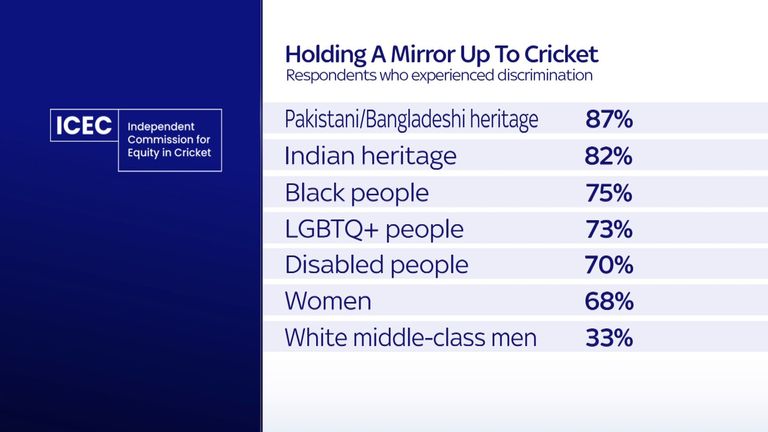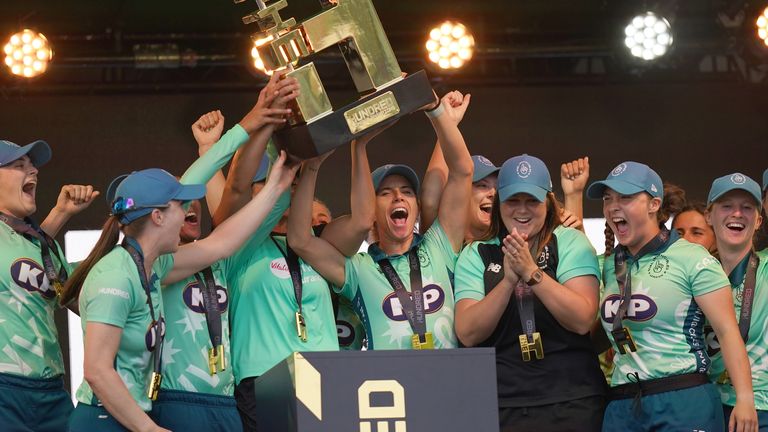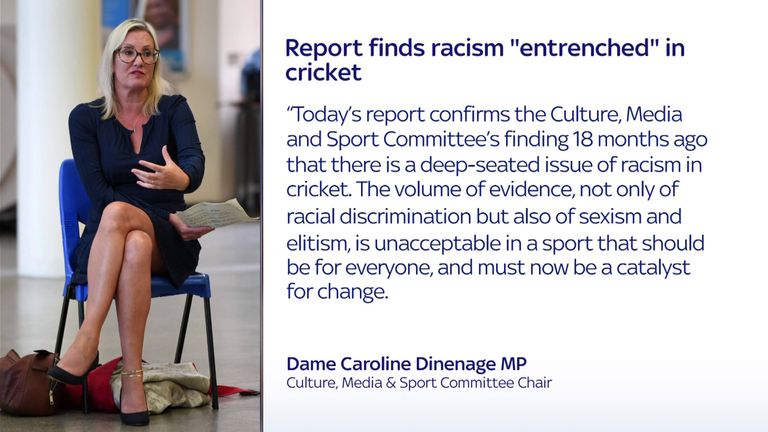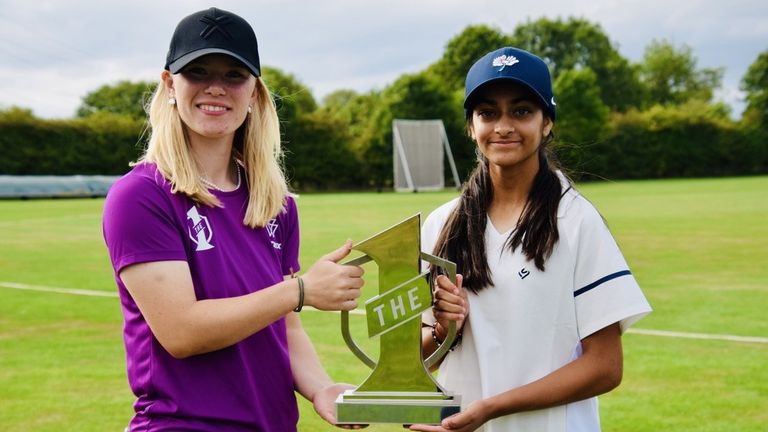The Independent Commission for Equity in Cricket (ICEC) has delivered its findings following a two-year investigation.
Below are all 44 recommendations from the report after more than 4,000 provided evidence.
Overarching Recommendation
- The ECB to make an unqualified public apology for its own failings and those of the game it governs acknowledging racism, sexism, elitism and class-based discrimination have existed, and still exist, in the game, and recognising the impact on victims of discrimination. It should include, in particular, a direct apology for the ECB’s and the wider game’s historical failures in relation to women’s and girls’ cricket and its failure to adequately support Black cricket in England and Wales.
State of Equity in Cricket
- The ECB publishes an updated ‘State of Equity in Cricket’ report every three years.
Culture
- Within 12 months, the ECB develops a set of cultural values to guide organisations and individuals participating in English and Welsh cricket.
- The ECB develop a programme of ongoing ‘culture health checks’, similar to those UK Sport has undertaken, to ensure it can track and monitor the progress of its initiatives to improve the cultural health of the game.
Approach to Equality, Diversity and Inclusion (EDI) in Cricket
- Within the next six months, the ECB puts in place mandatory, specialist, high-quality training to support the development of racial literacy amongst its leadership, as well as and the most senior leadership of the wider game.
- The ECB commits to being an anti-racist, anti-sexist and anti-classist organisation and encourages all other cricketing organisations to do the same.
- The ECB adopts a clear and consistent strategic approach to issues of EDI. Including, ensuring EDI is not relegated beneath commercial priorities; a greater emphasis on equity in decision making; unambiguously naming discrimination; carrying out EDI impact assessments for its existing and new programmes, and ensuring identity holders are no longer relied upon to highlight failures and drive change within cricket.
- The ECB substantially increases the money allocated towards advancing EDI in all areas of the game, particularly at recreational and talent pathway level.
- As a recipient of significant amounts of public fund, the ECB must comply with the Public Sector Equality Duty wherever possible.
- Within the next six months, the ECB establishes an Executive-level Chief Equity, Diversity and Inclusion Officer role.
- Within the next 12 months, the ECB undertakes an in-depth examination of the decline of cricket in Black communities in England and Wales and develops a targeted action plan to reverse that decline.
- Within the next 12 months, the ECB undertakes an in-depth examination of the class barriers that exist in cricket and develops a game-wide strategy to remove them.
- The ECB introduces gender-based budgeting into their next, and future, business planning cycle to analyse the fairness of their resource allocation decisions and the impact they have on gender equality. This analysis should consider race, class and gender, understanding that spending and investment decisions can have very different impacts on women and men, because of different starting points, needs and priorities.
Women and Girls’ Cricket
Governance and Leadership
- The women’s game should have equal representation to the men’s game throughout English and Welsh cricket’s governance structure.
- The ECB’s Articles of Association should be amended within the next six months to better reflect its role and responsibilities as the sport’s national governing body in relation to EDI, the references to upholding the spirit and traditions of cricket should be revised to be subject to the overriding duty to promote EDI.
- The annual fixtures between Eton and Harrow and between Oxford and Cambridge are no longer played at Lord’s after 2023. These two events should be replaced by national finals’ days for state school U15 competitions for boys and girls and a national finals’ day for competitions for men’s and women’s university teams.
- The ECB revises and clarifies its processes and criteria for allocating, suspending, cancelling and reinstating high profile matches to place greater emphasis on EDI. There is clear evidence that being allocated such matches, or having the right to host them withdrawn, is a powerful tool to encourage compliance with EDI.
- Stronger and clearer EDI standards are included in the next iteration of the County Partnership Agreement (CPA) and in the County Governance Framework (CGF), including an increased gender target for board representation of 50% and financial incentives for counties that meet their EDI targets.
- The available sanctions for failing to reach EDI standards within the next iteration of the County Partnership Agreement should be widened and strengthened.
- Within the next 12 months, a new regulatory body should be established, independent from the ECB. The new regulatory body, not the ECB, should be responsible for investigating alleged regulatory breaches and for making decisions about whether to bring charges.
- As far as possible, there should be a single set of regulations, and non-regulatory standards, which apply across both professional and recreational cricket.
- Regulatory matters should be reserved to cover only rules relating to discipline and integrity.
- Non-regulatory matters should be redefined as all other rules and standards within the game that do not relate to discipline and integrity. As well as dealing with regulatory matters, the new, independent regulatory body should be responsible for investigating relevant cricketing organisations with non-regulatory matters where they relate to EDI.
- All strategic and operational decisions made by the ECB Executive Management Team and/ or ECB Board should take account of any EDI implications.
- The ECB strengthens the diversity of its Board and Executive Management Team across ethnicity, gender and class/socio-economic status, achieving demonstrable progress within the next 24 months and introducing longer term targets.
Complaints
- The ECB reports clearly, publicly and annually on complaints in the professional and recreational game.
- Given the scale and scope of volunteers in cricket, the ECB, in collaboration with County cricket organisations, develops a game-wide volunteer strategy that includes how volunteers will be encouraged to contribute to cricket’s EDI aims, including specific training on discrimination and sexual harassment.
- The ECB ensures that centralised training and specialist support is available to all cricketing organisations so that they are properly equipped to deal with complaints.
- We recommend that leaders of cricketing organisations and match officials should be required to uphold high standards of behaviour, and be accountable for their failure to do so.
-
We recommend the following changes with respect to the Cricket Discipline Commission (CDC) or any future adjudication body if it is replaced and/or renamed:
a) The CDC’s jurisdiction should cover everyone working in the professional game, including Chairs, Chief Executives and all other ‘off field’ staff.
b) The sanctions available to the CDC should be strengthened, including the power to suspend or cancel the right to host high profile matches.
c) CDC Panels in discrimination cases must have specialist EDI expertise or access to specialist EDI support, and there should be appropriate levels of diversity amongst those who can sit on such Panels.
d) The CDC must be properly resourced by the ECB in terms of personnel and finance.
e) The CDC should have its own website on which it should publish full written reasons for every decision, save in exceptional circumstances which should be clearly defined.
f) There should be greater communication between the CDC and the ECB about cases that the former has handled, and the lessons learned.
g) Chairs of the CDC should be appointed by the ECB using expert external recruitment assistance to run an open and transparent recruitment process.
h) The Chair of the CDC should appoint remaining Panel members using the same process. Panel members must have an appropriate balance of skills, expertise and, importantly, diversity.
i) The Chair and Panel members should be appointed for a four-year term and serve a maximum of two terms. - The ECB revises the game’s regulations, in particular its discrimination-related regulations, to ensure that they are capable of adequately addressing complaints and provide an appropriate range of potential sanctions. This includes, expanding the The Anti-Discrimination Code to include socio-economic status and victimisation.
- We recommend that the ECB and wider game put in place processes to ensure that complaints can be raised and addressed by informal (as well as formal) means.
Schools and talent pathway
- The entire talent pathway structure should be overhauled to make it more meritocratic, inclusive, accountable, transparent and consistent:
Within the next 12 months the ECB should put in place a State Schools Action Plan. ECB money allocated to cricket below the U14 level should explicitly be re-allocated with the aim of ‘levelling the playing field’, delivering the investment, organisational structures, and approaches to talent identification necessary to ensure that there exists an equal pathway into professional cricket for the very large majority of the England and Wales population that attend only a state school. - To increase equity and reduce barriers to access, participation in the talent pathway should be made entirely free of direct costs. Financial assistance should also be made available where necessary to cover other costs incurred by participants in lower socio-economic groups such as travel and cost of equipment.
- The ECB and the Counties proactively seek to expand how and where they source ‘talent’ from, to include those who come through ‘non-traditional’ routes.
- By the start of the 2025 season, the ECB introduces accessible County – and national – level T20 competitions for state school boys’ and girls’ cricket teams in the U14 and U15 (school years 9 and 10) categories, to incentivise participation and aspiration in the state sector.
- The ECB, in collaboration with the Counties, develops a more robust and systematic approach to talent identification, introducing mandatory training for scouts, coaches and selectors encompassing how to recognise bias.
- Inter-County cricket should begin selection for representative at the U14 level and not before. This will mean that the widely documented challenges associated with talent identification in younger children are removed for the first three years, placing less emphasis on selection from U10 age groups onwards mitigates the very significant structural advantages that young children who attend private schools have over their state school counterparts.
- With the need for Counties to allocate resources to training a narrow County squad now removed, County Age Group coaches and pathway leaders should be tasked, as part of the State Schools Action Plan, with delivering a positive state school cricket offering at the U10-U13 level. This includes further develop meaningful partnerships with local cricket clubs to make their facilities available to children attending local state schools, for example through clubs offering their net facilities and outfields for weekday ‘after school clubs’ at times when local club facilities are often unused. Where ground maintenance presents barriers to achieving this, additional investment should be delivered to support the club.
- The ECB and wider game develop a system to regularly collate and monitor EDI data with respect to entry into and progression through the talent pathway (with respect to race, class and gender).
- We make the following recommendations to Government:
a) To collect and monitor data on how much cricket is being played in state schools.
b) To require and resource significantly higher levels of cricket in state schools.
c) In partnership with First Class Counties, County Cricket Boards and the ECB, actively work with private schools on opening up their cricket facilities and gifting a minimum (and significant) number of coaching hours to children who attend local state schools. - We recommend that the ECB publishes a detailed and considered response to this Report and each of its recommendations within the next three months, reflecting game-wide discussion on their implementation and including clarity on accountability for delivery.
#ICEC #report #recommendations #ECB #apologise #failings #action #Cricket #News






